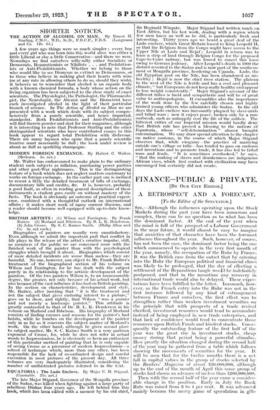EQUATORIA : The Lado Enclave. By Major C. H. Stigand.
(Constable. 21s. net.) The late Major Stigand, Governor of the Mongalla province of the Sudan, was killed when fighting against a large party of rebellious Dinkas four years ago. He left behind him this book, which has been edited with a memoir by his old chief,
Sir Reginald Wingate. Major Stigand had written much on East Africa, but his last work, dealing with a region which few men know as well as he did, is particularly fresh and interesting. Thirty years ago we heard a great deal of the Lado enclave, which Great Britain leased to King Leopold II. so that the Belgians from the Congo might have access to the Upper Nile at Lado and Rejaf ; Leopold in return was to lease a strip of land through Belgian Congo for the proposed Cape-to-Cairo railway, but was forced to cancel this lease owing to German jealousy. After Leopold's death in 1909 the district reverted to the Sudan and is now part of the southern- most or Mongalla province, bordering on Uganda. Ledo, the old Egyptian post on the Nile, has been abandoned as un- healthy ; Rejaf is now the chief river station. The plateau to the west of the Nile is fertile and has a cool and pleasant climate, " but Europeans do not keep really healthy and appear to lose weight consistently." Major Stigand's account of the different tribes is lucid and sympathetic and will be of great value to anthropologists. It exemplifies also the importance of the work done by the few carefully chosen and highly trained young officers who administer the Sudan. In the old days the Lado enclave was incessantly plagued by slave-raids and tribal wars ; now it enjoys peace, broken only by a rare outbreak, such as unhappily cost the life of the author. The bitterest critics of our Imperial mission would hardly deny that British rule has proved a blessing to the natives of Equatoria, whose " self-determination " almost brought extermination. We may draw special attention to the chapter on native customs, in the course of which Major Stigand observes that, while exogamy—the practice of marrying outside one's village or tribe—has tended to pass on customs and inventions and to promote trade, it has also led to tribal wars and feuds. " It is sometimes overlooked," he says, " that the making of slaves and drunkenness are indigenous African vices, which first contact with civilization may have encouraged but certainly did not create.


































 Previous page
Previous page